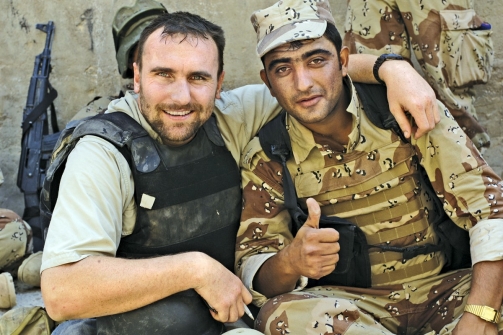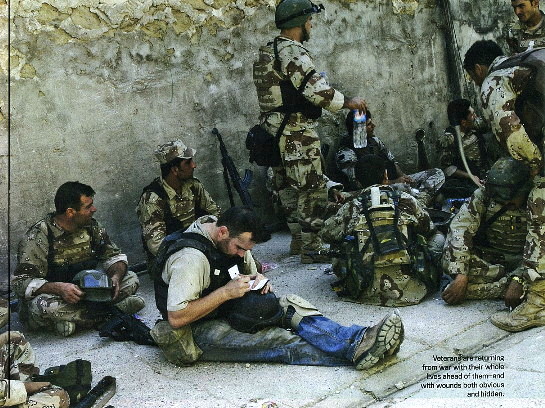Newsweek: The War Is Over, Closure Is Yet To Come
The Iraq War is finished. But for soldiers who fought there, and for journalists who covered the bloodiest battles, closure is yet to come.
Author: Michael Ware
I’m told the Iraq War is coming to an end.
From what I read and from what I hear it seems the war that began in 2003 will be over within two short weeks. Once the last few thousand troops are finally home. And once midnight strikes on this New Year’s Eve, for that’s the preordained moment when America’s right under international law to be in Iraq will expire.
And yet, somehow, I’m still confused. For somewhere within, from my heart of hearts, I just know for some of us the war in Iraq will probably never end. On New Year’s I know where I’ll be. I’ll have a drink in hand, overlooking one of my favorite Australian beaches, listening to revelers in the sand cheer as the clock strikes midnight. Yet, I gravely suspect, I will also be very much in Baghdad. And in Fallujah. And Ramadi. Tal Afar. Halabja. Amarah. And many, many other places.
Then, perhaps, I will see in the year with Capt. Sean Sims, a proud young father, and with Lt. Edward Iwan. Maybe Omar, my old translator. Abu Abdulraheman too, a good friend and an insurgent commander. I would play with his baby son for hours, realizing the boy was precisely the same age as the son I’d left at home. That insurgent leader once saved my life. And with Paul Moran, an Australian television cameraman who had a deep love for Kurdistan. Possibly even with the earnest-looking young boy I once saw out the back of a besieged Sadr City hospital. I’m sure there will be others. For these are but a few of my Iraq dead. Some I knew dearly. Others I only met in death.
If anything, I often think, perhaps we should grieve for the living. Those left behind, without a father or a mother. Those who must now face the rest of their days living a war without end. Like a young man the late Rep. John Murtha once spoke of at a D.C. press conference after he’d visited a military hospital. The kid had been blinded and lost both his hands taking care of U.S. bomblets. His mother kept vigil by his bedside. “Is there anything I can do for you?” Murtha says he asked. “Get him a Purple Heart,” was the mother’s reply. Because they were “friendly” bomblets, the boy so badly maimed had been denied the honor. “I told the commandant,” said Murtha, choking up before the cameras. “If you don’t give him a Purple Heart I’ll give him one of mine ... They gave him a Purple Heart.” Sometimes, when I let my mind wander, I wonder what it’s now like for that young veteran, the bulk of his life still waiting ahead of him. Without hands to touch. Or eyes to see.

Michael Ware with a member of the Iraqi Army in 2005., Franco Pagetti / VII
In odd little ways that story steels me for what I must face. That boy’s bravery, and the testament of that mother’s love, inspire me. On some of my bad days, thoughts of them spur me to just take one more step forward, not to just let it all go, even when that’s all it is I want to do.
A great, dear friend of mine to whom I was bonded forever one horrific night in the Battle of Fallujah in 2004 was wounded. But only after he returned to the United States. I have footage of him, caked in filth and wired from our days and days without sleep, on the flanks of the battle using my satellite phone to call home. “I love you,” I recorded him telling his wife, and the mother of his children. And once home, the parents on one of his kids’ sporting teams expressed concern about whether my friend might curse, or be aggressive, because he’d been in Iraq. I think that floored him. He couldn’t believe it. After all he’d survived, after all he’d done for his country. This.
That friend is SSG David Bellavia. And in or out of uniform you’d be hard-pressed to find a finer or more decent man. And I should know. For I’m proud to say I helped nominate this incredible soldier for the Medal of Honor. On David’s 29th birthday, a dark and awful November night in 2004, I saw him do the most extraordinary things. Out of love, out of fear, out of truly uncommon valor.
In the Battle of Fallujah his platoon had been tasked to search a darkened block of perhaps 20 or 30 high-walled houses in to which six to eight suicidal al Qaeda members had been seen fleeing and where they were trapped. The search began around 7 p.m., one house after another, all pitch black and eerily empty. It wasn’t until sometime around 1 a.m. that the platoon, now beyond exhaustion and drained of anything except the barest instincts for survival, entered house number 20. In through the iron gates, across the garden, the carport, into the living room. It was only when a tender young soldier stepped through a door into the small hallway and toward the kitchen and the stairs leading to the second floor that we found where the al Qaeda fighters were lurking.
The first pair were waiting beneath the stairs; encased behind prepositioned sandbags and cinderblocks, they were ready with a belt-fed machine gun, rifles, and a rocket-propelled grenade. In the dark, they opened fire upon us from point-blank range.
The bullets were literally coming through the walls. The kid was yanked back into the living room. We later saw a bullet hole through the tail of his shirt. The entire platoon was pinned, and it was only when David grabbed a machine gun and stepped back into that hallway that the platoon could scramble back out of the house. Eventually David and I made an unspoken pact. Someone would have to go back in there, and it was going to be us. With my little camera rolling (good just for audio, as the only illumination came from the muzzle flashes of the weapons fired just feet away), David set forth to kill those fighters, or to die trying. Before it was done, the fighting would be hand to hand. The al Qaeda members dispersed throughout the house; hiding in cupboards and the ceiling and all itching to die, taking us with them. “We were all freaked out,” David told an Australian documentary team last year. “Bogeymen, we were fighting bogeymen.” By the time I could finally turn on the night vision on my camera, I recorded us dragging the bodies of six of those fighters out of the house and piling them up on the pavement. Another, mortally wounded, escaped out a window and crawled off to die.
David was instantly awarded the Distinguished Service Cross. Yet it sickens me, as I sit here now with the sounds of my recording raging around me as guns blaze and David and I breathlessly yell to each other inside that house, that my friend has not yet been awarded the Medal of Honor. I have much unfinished business from the war, things I must complete before I can hope for my war to be over, and seeing David awarded that medal is one of my things.
There’s still a half dozen or so families I’m yet to save from Iraq: those from my staff, all of whom risk death should it be known they worked for a foreigner like me. There’s a myriad of issues concerning veterans’ care, both here in Australia and in the States, I’m not yet done yelling about. There’s a peaceful night’s sleep I’m yet to find. And, as Gen. George S. Patton commands me, there’s a host of lives I’ve yet to finish thanking for having lived.
But the war, they tell me, is coming to an end.
Correction: A previous version of this article erroneously reported that SSG David Bellavia and his wife were no longer married. They have been married for 12 years.
The print version of Newsweek has a second photo from Franco Pagetti:

